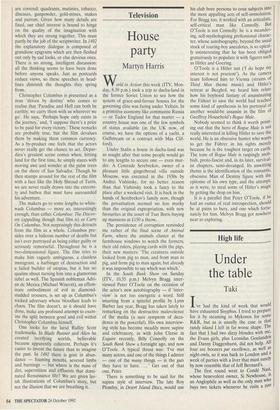Television
House party
Martyn Harris
World in Action this week (ITV, Mon- day, 8.30 p.m.) took a trip to dacha-land in the former Soviet Union to see how the system of grace-and-favour houses for the governing elite was faring under Yeltsin. In a primitive economy like communist Russia — or Tudor England for that matter — a country house was one of the few symbols of status available (in the UK now, of course, we have the options of a yacht, a Gulfstream or a contract with Max Clif- ford).
Under Stalin a house in dacha-land was so sought after that some people would go to any lengths to secure one — even mur- der. A Comrade Serebrekov, owner of a pleasant little gingerbread villa outside Moscow, was executed in the 1930s by Andrei Vishinsky, for no better reason than that Vishinsky took a fancy to the place after a weekend visit. It is back in the hands of Serebrekov's family now, though the privatisation seemed no less murky than the original expropriation, with new favourites at the court of Tsar Boris buying up mansions at £150 a throw.
The persistence of corruption reminded me rather of the final scene of Animal Farm, where the animals cluster at the farmhouse windows to watch the farmers, their old rulers, playing cards with the pigs, their new masters: 'The creatures outside looked from pig to man, and from man to pig, and from pig to man again; but already it was impossible to say which was which.'
In the South Bank Show on Sunday (ITV, 10.35 p.m.) Melvyn Bragg inter- viewed Peter O'Toole on the occasion of the actor's new autobiography — if 'inter- view' is not too energetic a word. Still smarting from a spiteful profile by Lynn Barber last year, Bragg has taken lately to remarking on the destructive malevolence of the media (a sure symptom of deca- dence in the powerful). His own interview- ing style has become steadily more supine and celebratory, as with John Cleese in Esquire recently, Billy Connolly on the South Bank Show a fortnight ago, and now O'Toole. A typical thrust was: 'I've met many actors, and one of the things I admire — one of the many things — is the guts they have to have. . . . ' Get out of that one, Peter.
There is something to be said for the supine style of interview. The late Roy Plomley, in Desert Island Discs, would use his club bore persona to coax subjects into the most appalling acts of self-immolation. For Bragg too, it worked with an articulate, self-critical man like Connolly. But O'Toole is not Connolly: he is a meander- ing, self-mythologising professional charac- ter, whose autobiography, beyond the usual stock of roaring-boy anecdotes, is so epical- ly uninteresting that he has been obliged gratuitously to populate it with figures such as Hitler and Goering.
O'Toole is a Hitler nut CI do hope my interest is not prurient'). As the camera team followed him to Vienna (strains of Third Man theme music) and Hitler's retreat at Berghof, we heard him relate how his boyhood fantasy of assassinating the Ffihrer to save the world had reached some kind of apotheosis in his portrayal of another would-be assassin in the film of Geoffrey Household's Rogue Male.
Nobody seemed to think it worth point- ing out that the hero of Rogue Male is not really interested in killing Hitler to save the world. He is an obsessive hunter who wants to get the Fiihrer in his sights merely because he is the toughest target on earth. The tone of Rogue Male is raspingly snob- bish, proto-fascist and, in its later, survival- ist chapters, semi-deranged. Its unwitting theme is the identification of the romantic, obsessive Man of Destiny figure with the epitome of his own type, and the attempt, as it were, to steal some of Hitler's magic by getting the drop on him.
It is a parallel that Peter O'Toole, if he had an ounce of real introspection, should be at pains to bury, and one which fortu- nately for him, Melvyn Bragg got nowhere near to exploring.


































































 Previous page
Previous page